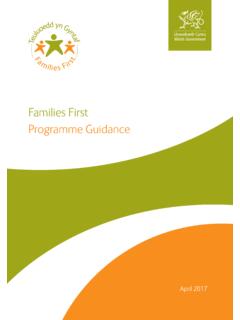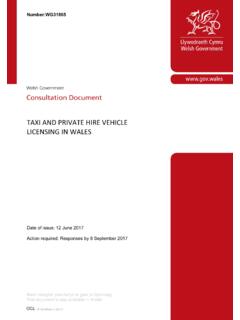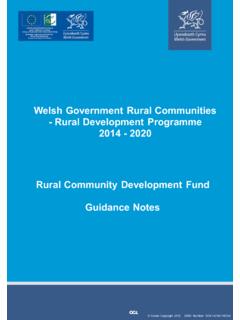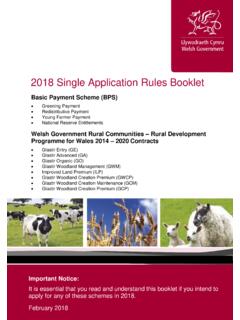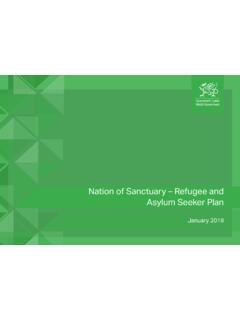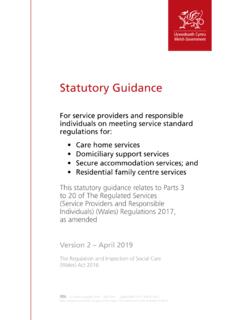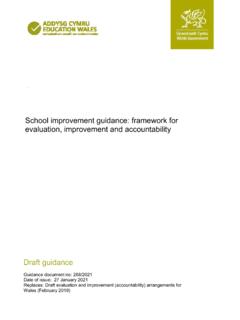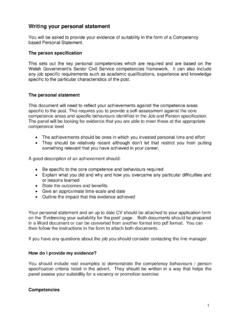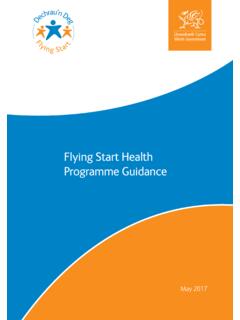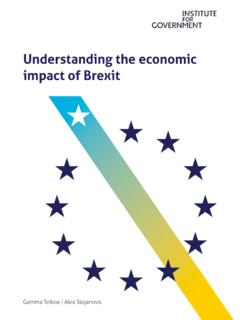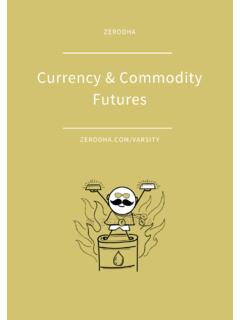Transcription of Beyond Recycling - Home | GOV.WALES
1 Crown copyright 2021 WG42019 Digital ISBN 978-1-80082-903-9 Mae r ddogfen yma hefyd ar gael yn Gymraeg / This document is also available in Welsh Beyond RecyclingA strategy to make the circulareconomy in Wales a reality2 Contents Ministerial Foreword 4 How we will move to a more circular economy 6 A Foundation for Future Success The context 8 A Challenging Time The Covid-19 Pandemic; brexit and Climate Change 10 How we want to get there 13 The Six Core Themes: innovation in materials prevention and on our Recycling in community and business Government levers15 19 22 25 28 31 How you can get involved 34 Measuring progress 36 3 4 Ministerial Foreword We are living in an unprecedented time. The coronavirus pandemic has had a major impact on how we live our lives, brexit has changed how we trade with neighbouring countries and climate change is bringing record global temperatures and extreme weather events.
2 Despite these challenges, there are however important signs of positive change. The pandemic has seen communities and businesses across Wales coming together to take action to care for their surroundings and each other. We know collectively we can make a big difference to the lives of people around us and our wider environment. Our national Recycling rate has now reached over 65%, exceeding our latest target and cementing Wales place as one of the highest Recycling nations in the World. Our targets, investment and partnership working have all been key ingredients of this success, but achieving it has ultimately been down to people Recycling at home in every part of Wales which has collectively made a huge national difference. How we manage resources has never been more important. The pandemic has shown us what we need and use cannot be taken for granted. As we look to develop a strong recovery from the pandemic, the Welsh Government is committed to making sure it is a green and just recovery.
3 To truly be green, we must take steps to tackle climate change and reverse the decline in biodiversity, working towards a Wales which consumes a fair share of the Earth s resources. The UK Climate Change Committee recently reported that the measures proposed in this Strategy will reduce emissions. We recognise that we must take action on unsustainable consumption which is impacting on our climate and biodiversity. A circular economy where we value resources by keeping them in use is a critical element of a green and just recovery because it will work to reduce our consumption and prevent waste. The transition to this approach has already started and we need to accelerate this to improve both our economic and social outcomes by increasing Wales resilience. Shorter supply chains, and realising the value in our resources, are as key to our recovery from the pandemic and mitigating the negative impacts of brexit as are actions to decarbonise and reduce waste.
4 In publishing this Strategy, we are setting out our commitment to action as a Government to use the powers and levers that we have to the fullest extent to accelerate our transition to a circular, low carbon economy. This includes areas like tackling single-use plastics that were strongly emphasised by the response to our consultations. However, the recent passing of the Internal Market Act may hamper our ability to take some of the actions we have already committed to take as its impact on Wales devolved competence is uncertain. This is why we have commenced legal proceedings to challenge the Act and the potential ability for the UK Government to fetter Wales ability to take action. Our aim in bringing forward this Strategy has not just been to set out our ambition over the course of the next decade but to accelerate action. That is why after publishing the 5 Strategy for consultation, we committed to taking action from the outset, recognising the urgent response needed to the climate emergency and related biodiversity crisis.
5 Over the last year, we have made funding of over 43 million available through the Circular Economy Fund, to businesses and publicly funded bodies like Local Authorities and universities to develop a range of innovative projects. This has ranged from the cutting edge Remakerspace at Cardiff University working with business to improve product design to a repair shed supporting the local community in Llangollen. Projects such as these provide us with evidence to consider further and wider support. More businesses and enterprises are being set up in Wales to innovate and grow the circular economy, like Frugalpac in North Wales developing paper alternatives to plastic drink containers, Riversimple in Mid Wales designing a new hydrogen powered car using a circular business model and Smile Plastics in South Wales developing work surfaces from difficult to recycle plastics. Taking the next steps on our pathway towards a zero waste, low carbon economy has never been more important; but as a country our progress to date has already shown our ability to deliver.
6 Lesley Griffiths MS Minister for Environment, Energy and Rural Affairs March 2021 6 How we will move to a more circular economy A circular economy keeps resources and materials in use for as long as possible and avoids all waste. This will mean moving away from a linear economy which assumes a constant supply of natural resources or the take-make-use-dispose culture based on the extraction of resources, the production of goods and services, and the disposal of post-consumer waste. Moving to a circular economy is key to the delivery of key environmental outcomes because it can significantly reduce our carbon emissions and our over-exploitation of natural resources, and help to reverse the decline in biodiversity. But crucially it can also improve economic and social outcomes. Economically, through taking a circular approach which shortens supply chains, it can improve efficiency, create employment and increase competitiveness.
7 In terms of social benefits, shortening supply chains and reducing emissions will reduce the health impacts caused by pollution and help to more fairly distribute resources. This will also provide more opportunities for communities to come together to share resources and revitalise where we live. To accelerate our journey towards a circular economy we will prioritise eight ambitious headline actions: 1. We will support businesses in Wales to reduce their carbon footprint by becoming more resource efficient. This will enable our businesses to be more productive and competitive, particularly in a decarbonising global economy whilst increasing their resilience. 2. We will provide the tools to enable community action. This means supporting the local actions which collectively make a big difference. We will engage with our schools and communities working with citizens to support local initiatives and resource efficient actions.
8 3. We will phase out unnecessary single-use items, especially plastic. We will send zero plastic to landfill and progressively reduce the amount sent to energy recovery. We will achieve this with game-changing reforms such as an Extended Producer Responsibility Scheme for packaging, a Deposit Return Scheme for drinks containers and by applying bans or restrictions on unnecessary single-use items. 4. We will eradicate avoidable food waste. We will do this by working with businesses across the whole supply chain, from farm to fork, to minimise waste, maximise resource efficiency and working to limit food waste in all settings. 5. We will procure on a basis which prioritises goods and products which are made from remanufactured, refurbished and recycled materials or come from low carbon and sustainable materials like wood. In doing so we will drive a step change across the public sector in Wales so that the procurement of sustainable goods and products becomes the norm, whilst phasing out the procurement of non-sustainable alternatives.
9 This is a key part of our delivery of a net zero public sector in Wales and how we use the purchasing power of the 7 public sector to improve our economic and social outcomes as well as the improvement of our environmental ones. 6. We will strive to achieve the highest rates of Recycling in the world. This includes working with local government, businesses, social enterprises and communities to take the next steps in becoming a truly advanced Recycling nation. A key step will be to transform the Recycling of commercial, industrial, construction and demolition waste. 7. We will reduce the environmental impact of the waste collection from our homes and businesses. We will introduce ultra-low emission vehicles and invest in the infrastructure to power them with renewable energy, thereby reducing emissions and improving air quality. We will improve how materials are collected and processed, including by embracing digital and smart technologies.
10 8. We will take full responsibility for our waste. We will reduce the amount of waste that we produce and effectively manage what we create by having the infrastructure we need. We will also ensure we do not export problem waste elsewhere. We will work with international partners to help them to tackle their waste issues and reduce the adverse impact of our consumption on other countries as well as learn from practice elsewhere. 8 A Foundation for Future Success Our context There is much to be proud of with what we have achieved to date. Our commitment to lead the way on tackling waste over the last two decades has seen Wales go from Recycling less than 5% of our municipal waste at the start of devolution to around two-thirds today. Put simply, we are pretty mighty at Recycling . We have created a strong foundation in waste and Recycling in Wales - it is embedded in our culture and it is this foundation which provides the platform to take the next steps and move to a more circular economy.
